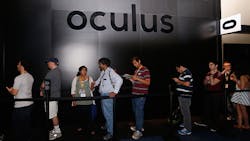Reach Out and Touch Virtual Worlds with Oculus
LOS ANGELES — Behind closed doors on the show floor of the world's premier video game show, Facebook-owned Oculus was letting people touch virtual worlds.
Oculus provided a select few with an early peek at how it’s trying to tackle the challenge of letting people intuitively interact with faux objects in fantasy realms.
Prototype Oculus Touch Half Moon controllers that can be gripped as easily as clasping a pistol gave in-world hands to people wearing the company's Rift virtual reality head gear.
Words such as "awesome" and "cool" sprang from the lips of those immersed in a sample virtual world where Touch controllers let them play table tennis, detonate fireworks, blast targets with ray guns and even sock robots.
An Oculus developer appeared in the demo as a shimmering ghostly head and hands. In-world characters could toss things at or to another, or work together on tasks such as lighting pyrotechnics. The vision is that people could be continents apart in the real world but play a game like tether ball together in a virtual setting.
The effect was so real that it was instinctive to stop suddenly for fear of bumping into a virtual table top, or to catch a dropped toy or ping pong ball.
Is this the real life? Is this just fantasy?
"In virtual reality, you are going to find yourself reminding your brain that this is not real," Oculus chief executive Brendan Iribe said last week during a media event in San Francisco where a market-ready version of Rift was revealed. "It is a paradigm change."
At one point in the demo, the scene changed to outer space and everything floated in the seeming absence of gravity. After coming back to Earth, a blast of a pretend shrink ray turned one tiny.
Oculus has aimed squarely at video game lovers with Rift headsets that it will begin selling early next year.
Many developers at E3 — the annual Electronic Entertainment Expo — were working on games for virtual reality.
Oculus did not disclose pricing for Rift, which will launch with an Xbox controller due to an alliance with console maker Microsoft.
Combining Xbox controllers with Oculus provides a familiar way for gamers to interact with virtual worlds using Rift, so the head gear can get to market without waiting for Touch to be ready.
The alliance also raises the potential for Oculus virtual reality gear to synch with Xbox consoles as well as across the range of devices that will be powered by Windows 10 computer operating software set for release later this year.
Oculus founder Palmer Luckey unveiled the prototype Touch in San Francisco last week.
"You need to be able to pick up a gun from a table, fire it, and throw it away without even thinking about it," Luckey said. "You can light explosives, pull robots limb from limb, punch garden gnomes, ... lots of cool experiences."
Facebook last year bought Oculus for some $2 billion.
Game developers dive right in
The expansive E3 show floor was rich with VR offerings from developers working on games for immersive head gear expected to hit the market in force next year.
Lines were long through the day as people at the world's leading video game trade show jockeyed to experience what it’s like to venture into fantasy worlds.
"People love VR," Robyn Gray of Other World Interactive said while showing off a game that transported players to a space arena where they destroyed asteroids with friends. "It’s still like this magical, sparkly Christmas-time present."
Virtual reality calls on developers to rethink approaches, taking into account factors such as how uncomfortable head gear might become after hours of play and creative new ways to interact with digital realms.
By Glenn Chapman
Copyright Agence France-Presse, 2015
About the Author
Agence France-Presse
Copyright Agence France-Presse, 2002-2025. AFP text, photos, graphics and logos shall not be reproduced, published, broadcast, rewritten for broadcast or publication or redistributed directly or indirectly in any medium. AFP shall not be held liable for any delays, inaccuracies, errors or omissions in any AFP content, or for any actions taken in consequence.
